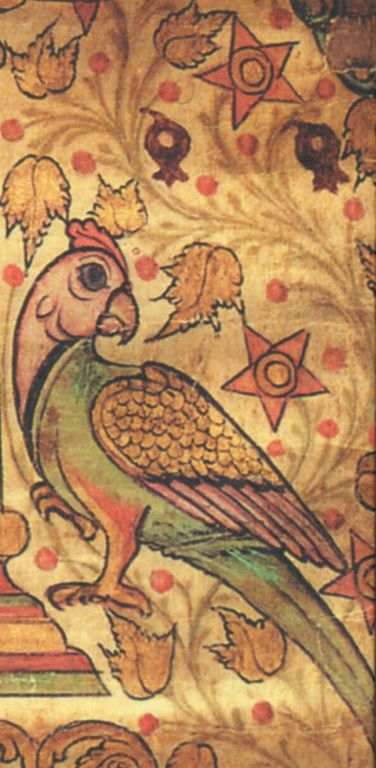1981/ 1977
16. Song of the Ten Commandments
This song was recorded by women from three different Kerala Jewish communities, each with a different melody and arrangement.
16a. Miriam Daniel, Rahel Nehemiah, Toba Sofer, Simcha Yosef. Recorded by Avigdor Herzog, Moshav Taoz, November 9, 1981; III-17a.
Taṃbirānda tuņayālě (x2)
Pattaruḷappāḍuņḍāyi (x2
1. With the help of Lord Tamburan, (x2)
Ten commandments came to be. (x2)2. Moshe Rabbenu went; (x2)
On Sinai Mountain he stood. (x2)3. The Torah he received (x2)
And gave to Israel. (x2)4. Receiving it in their hands, (x2)
Israel bowed and prayed. (x2).5. Three times without fail (x2)
To the Great God we should pray. (x2)6. The Torah, our foundation, (x2)
Was carefully carried inside. (x2)7. May the holy congregation (x2)
In the precious paḷḷi praise. (x2).
8. Ālěluya, ālěluya, (x2)
Ālěluya, ālěluya!
16b. Leah Madai. Recorded by Marcia Walerstein-Sibony, Moshav Aviezer, 1981; III-17b.
Taṃburānda tuņayālě (x2)
Pattaruḷappāḍuņḍāyi— Āa-ayyumma (x2)
1. With the help of Lord Tamburan, (x2)
Ten commandments came to be. Āa-ayyumma (x2)2. Moshe Rabbenu went; (x2)
On Sinai Mountain he stood. Āa-ayyumma (x2)3. The Torah he received, (x2)
And gave to Israel. Āa-ayyumma (x2)4. Receiving it in their hands, (x2)
Israel bowed and prayed. Āa-ayyumma (x2)5. Three times without fail (x2)
To the Great God we should pray. Āa-ayyumma (x2)6. The Torah, our foundation (x2)
Was carefully carried inside, Āa-ayyumma (x2)7. By the holy congregation (x2)
In the precious paḷḷi it was placed. Āa-ayyumma (x2)8. Forever may we praise! (x2)
Oh Great God, may it be. Āa-ayyumma (x2)
16c. Sarah Cohen. Recorded by Barbara Johnson, Kochi, January 13, 1977; III-17c
Taṃburān muyiṃbu tŏņayāyi, pattaruḷappāḍuņḍāyi
Mośěyi ṟabbenuṃ cěnnu, sīnāyi malamel ninnu
1. Lord Tamburan, be our first help!
Ten commandments were made.2. Moshe Rabenu went;
On Sinai Mountain he stood.3. The Torah he received
And gave to Israel.4. Receiving it in their hands,
Israel bowed and prayed.5. This treasured Sefer Torah
Was carefully taken inside,6. And by the holy congregation
In the precious paḷḷi was placed.7. Inside the precious paḷḷi,
Oh Lord forever we praise!
This song for the dedication of a new sefer Torah is performed in three different communities with three completely different tunes, but with only slight differences in text. Versions 16a from Kadavumbhagam-Kochi (with each line repeated) and 16b from Parur (with repetitions and the “Ayyumma” refrain) are the most similar in their folk style. When the Parur version was recorded in 1981 by Leah Madai from Parur, she sang from memory and said she had forgotten parts of the song. In contrast to the two folk-style versions, the Paradesi song (16c) was sung by Sarah Cohen (without repetitions or a refrain) to the melody of a Hebrew piyyut: Torat ’Adonai Temimah (’Areshet 1980, 204), customarily sung during the sixth hakafah procession of Simḥat Torah afternoon. Sarah identified this Malayalam “Song of the Ten Commandments” as a kurukan (“short song”) appended to song 15 (“Sefer Torah Dedication Song”) in the song notebook from which she was singing. On another occasion she recorded song 15 using two different Hebrew melodies for Simhat Torah.
Comparing the words rather than the melodies of the three song 16 versions, we find that all three recount the giving of the Torah on Sinai to Moshe Rabban, its acceptance by Israel, and the taking of a new sefer Torah scroll into the synagogue. In the fourth stanza of each version, Israel bows down to accept the Torah, but only in the Parur and Kadavumbhagam versions is this action illuminated by a subsequent stanza, omitted in the Paradesi version: “Three times without fail to the Great God you must pray.” Kerala Jews use the Malayalam term kuṃbiṭu (bowing down) to refer to the liturgical ‘Amidah prayer of eighteen blessings, which should be recited three times each day while standing, with bowing at designated points in the prayer. The Hebrew term kahal kadosh (holy congregation) appears in stanza 7 of all three versions.
By presenting “Song of the Ten Commandments” as three versions of the same song (16a, 16b, 16c), we highlight the almost identical texts shared by each version rather than the three very different musical presentations. Focusing on the translated words, we may see one song, but listening to the recorded performances, we hear three. The musical transcriptions provide a connecting bridge.







